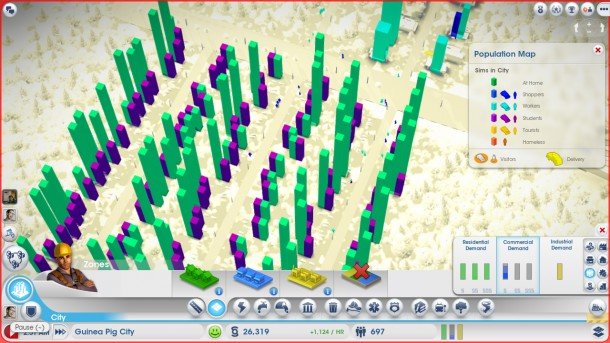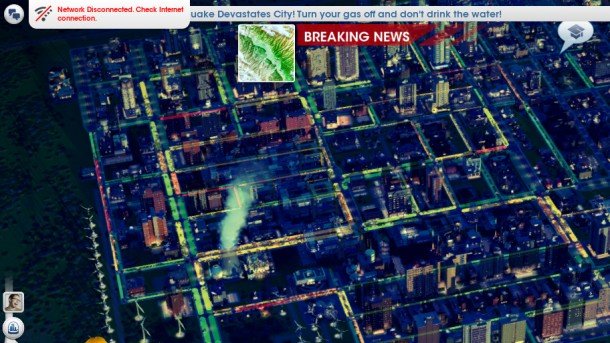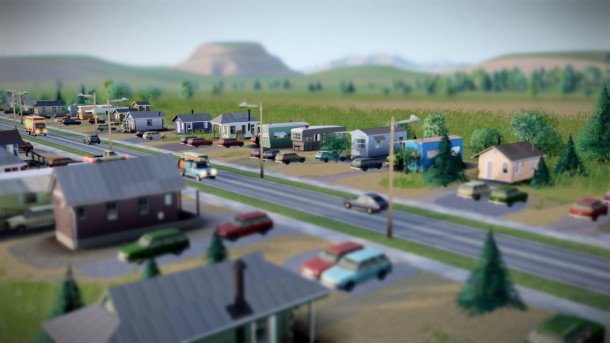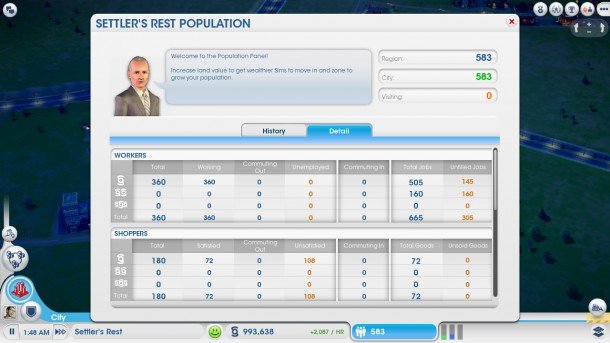SimCity tested: offline play, phantom Sims, and other controversies verified or debunked

The connection problems of SimCity's botched launch may almost be behind us, but now that more players are actually playing, the critical bombardment has adjusted its aim to target the simulation itself. Players are reporting bugs, quirks, and mysterious behaviors, and discontent has swelled into accusations. Our review criticizes many of these problems, but is there a bigger story? Were we misled?
Posing that question without answering it would just be rhetoric, so I've run my own experiments to directly test the biggest claims. In addition to judging their accuracy, I've provided context to inform judgment on whether we were misinformed by our own assumptions or by Maxis itself, as well as my opinions on the individual controversies.
[Update] Just after this article was written, SimCity Lead Designer Stone Librande published a post which explains more about some of these issues and the design decisions behind them. He also promises a patch to car pathfinding to help alleviate traffic jams.
"SimCity can be played offline"
True — cities can be simulated locally
If you cut off your internet connection while playing SimCity, it doesn't dump you back to the launcher. It warns you, but continues to simulate your city normally until it decides you've been mucking around offline for too long and boots you. But now a modder claims that he enabled offline play for longer than the 20 minute limit by tweaking the game's package files. (The video shows debug mode, which I'll get to later—the claim appears in the description.)

I haven't been able to test that claim yet, but it isn't necessary—20 minutes is long enough to establish that SimCity can simulate a single city locally. So where are the "portions of the computing" that Maxis GM Lucy Bradshaw claimed happen on EA's servers? Most likely, Bradshaw was referring to the common pool of regional data cities draw from, which informs interactions like commuting workers and shoppers. From what I can tell on the front-end, it's essentially shared cloud saving.
There's also the Global Market (a shared commodities exchange), leaderboards, achievements, and other standard online game niceties, but there is no evidence that the core single-player experience can't be replicated offline for longer than the connection timer allows.
Maxis seems to be leaving out the caveat: you can't play SimCity offline as it was intended , and it's intended to be a connected experience. This is an unfortunate stance, because as I stated in my review, the bulk of my fun was a solo experience.
Keep up to date with the most important stories and the best deals, as picked by the PC Gamer team.
"Sims don't remember their houses or jobs"
True — But Maxis never hid this behavior
It is true that Sims can go to a different job each morning and return to a different house each night, and that they seem to seek the nearest instance of a building type to fulfill their desires. In a way, it's an elegant solution—with little processing per Sim, it encourages the creation of wealth-segmented neighborhoods which satisfy multiple desires. At higher populations, however, it can abruptly lead to a traffic gridlock and other unintended behaviors, something I criticized in our review.

Sleuths who have done their research already know there's no conspiracy here, because Maxis has said from the start that this is how Sims work. In fact, the May 2012 issue of PC Gamer US contains our first feature on SimCity, and in it I wrote:
"These Sims aren't as complex as the families we love to torture in The Sims. They start each day at the top of a flowchart, asking a series of simple questions such as: 'Am I sick? Do I have shopping money? Do I need to find a job? If there aren't any jobs, is there a park to sit in?'"
This was repeated and elaborated on in many subsequent previews and interviews with developers, both here and at other outlets. We were never misled about Sim behavior.
"Total population exceeds the actual number of Sims"
True — The population count seems to be flavor text
After 500 residents, every house of six adds about .5 people to a city's total population count. That ratio seems to increase with population, so that at 200,000 residents, somewhere around 20,000 appear to actually be simulated Sims.
To test this, I built a city containing exactly 90 low-wealth houses. Each house adds six Sims to the population, so 90 houses should give me a population of 540. The reported population, however, was 583—a discrepancy of 43, almost exactly half the number of houses. The community is calling these mysterious population padders "phantom Sims."

The population chart supports this observation. If you add up the total number of reported workers, shoppers, students, and homeless in a city, you get the correct number—in my 90 house town, the total was 140. That means the "total population" is likely flavor text which is meant to represent the fiction of the city—perhaps it accounts for children, who aren't otherwise factored in.
Because SimCity was sold largely on the power of its simulation engine, this should have been explicitly stated, but it's not actively hidden and doesn't change my overall appraisal of the game. SimCity is a game—its job is to create the illusion of a city, not to achieve a perfect 1-to-1 simulation.
Our assumption that the population count was part of that simulation and not a fictional game element was justified, but I haven't seen any marketing which explicitly states that. It should have been stated to avoid the apparent deception, but our assumptions aren't required features.
Most likely, things don't work so well with 100,000 individual Sims, and I think most would have accepted that if it were stated up front. After all, we accepted that our SimCity 4 cities didn't actually have 1,000,000 residents, or any at all, except as a number. It's a shame this wasn't communicated better, or it could have been a non-issue.

Tyler grew up in Silicon Valley during the '80s and '90s, playing games like Zork and Arkanoid on early PCs. He was later captivated by Myst, SimCity, Civilization, Command & Conquer, all the shooters they call "boomer shooters" now, and PS1 classic Bushido Blade (that's right: he had Bleem!). Tyler joined PC Gamer in 2011, and today he's focused on the site's news coverage. His hobbies include amateur boxing and adding to his 1,200-plus hours in Rocket League.

